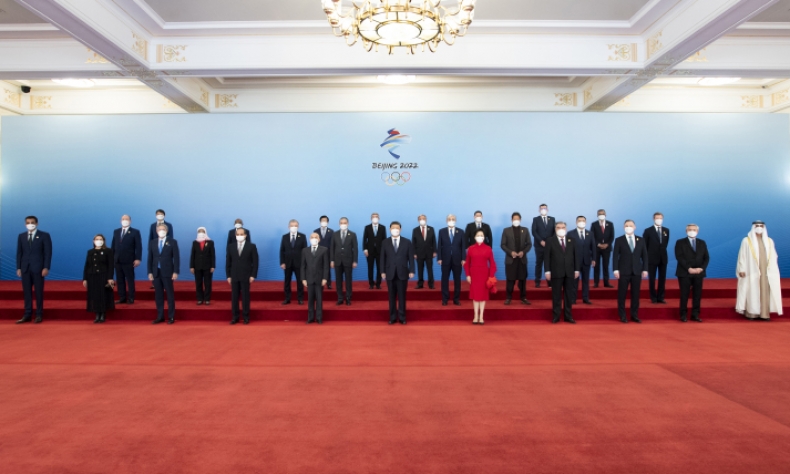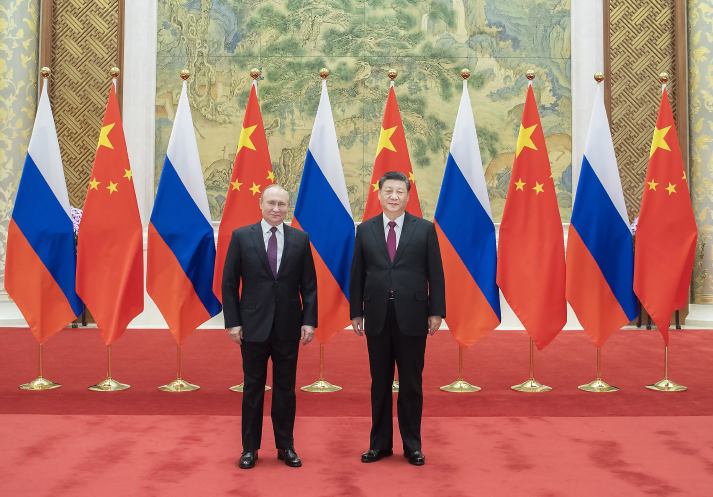Mutual Respect, Equality and Consultation

Mankind must continuously advocate mutual respect, equality, dialogue and consultation, strive to bridge differences and eliminate conflict, and join hands to deliver on a promise of enduring peace and harmony.
“We shall promote the spirit of the Olympic Movement and meet the common challenges facing the international community through solidarity,” Chinese President Xi Jinping said in his toast at the banquet welcoming distinguished international guests who had earlier attended the opening ceremony of the Olympic Winter Games Beijing 2022.
Despite the lingering COVID-19 pandemic, the Beijing 2022 Games are unfolding as scheduled. Roughly 170 official representatives from nearly 70 countries, regions and international organizations, including 31 heads of state and government, members of royal families and leaders of international organizations, attended the opening ceremony on February 4. Their presence supported the Olympic cause in the spirit of friendship, solidarity and fair play.
In the words of UN Secretary General António Guterres, “The world now needs a successful Winter Olympics to send a clear message that people of any country, ethnicity and religion can rise above differences to achieve solidarity and cooperation.” It seems Beijing 2022 is poised to deliver on that vision.

Mutual respect
Among the international leaders who showed up at the opening ceremony, Russian President Vladimir Putin undoubtedly became the top focus of many a media outlet. Putin landed in Beijing at 2 p.m., held talks with President Xi and then attended the opening ceremony at 8 p.m., flying out only three hours later. His country currently faces a major geopolitical security challenge, yet even amid tensions running high, Putin visited China as scheduled, denoting the central position of Sino-Russian relations in Russia’s diplomatic strategy.
During the nine-hour visit, the two countries managed to achieve productive results, signing nearly 20 cooperation documents covering economics, trade, investment, energy, and sports. They also issued a joint statement entitled International Relations Entering a New Era and Global Sustainable Development. The latter emphasizes the common positions of China and Russia on the concepts of democracy, development and security, and calls on all relevant countries and organizations to abandon any ideologized Cold War approaches, respect the sovereignty, security and interests of all countries, acknowledge civilizational and cultural-historical diversity, and act toward the peaceful development of all states in objective and fair manner.
China and Russia both strongly oppose a return of international relations to the era of big power confrontation and hope to forge a new type of international relations that does not use ideology as a barrier or the size of a country as a standard.
Another diplomatic detail that made the rounds on Chinese social media involved the brief yet kindhearted encounter between President Xi and Prince Albert II of Monaco, who competed in bobsledding at the Winter Olympics five times between 1988 and 2002.
President Xi told the father of twins, “I hear you’re going to bring home a Bing Dwen Dwen (the wildly popular Olympic mascot). Given you have twins, you’ll need two. Please choose a pair. We hope that as they (the twins) grow up, they will become as talented and keen on winter sports as you are.”
As both leaders mentioned during their talks, China-Monaco relations have become a model for friendly exchanges and mutual benefits between countries of different sizes, histories and cultures.

Zero threshold
In an interview with the Chinese media, Pakistani Prime Minister Imran Khan said he was impressed by the fact that the Chinese audience gave the Pakistani delegation the warmest applause, aside from the home team, at the Beijing Winter Olympics opening ceremony.
The relationship between China and Pakistan is ironclad, both at the official and non-governmental levels. Since their establishment of diplomatic relations more than 70 years ago, friendship between the two countries has never wavered. Many Chinese will remember how Pakistan extended a helping hand to China immediately after the Wenchuan earthquake in 2008; in March 2020, when China was hit hard by COVID-19, Pakistani President Arif Alvi visited China in person to express his confidence that China would be able to overcome the epidemic turbulence; when a scattering of Western powers tried to politicize the Beijing Winter Olympics in 2021, Pakistan stood with China in clear-cut manner.
Pakistan’s latest National Security Policy (2022-26) document clearly states that its strategic choice is to focus on economic development and that it has no intention of falling into geopolitical confrontation. China supports the country by aiding Pakistan to better execute epidemic prevention and control measures, and by overcoming many obstacles in the completion of multiple projects under the China-Pakistan Economic Corridor, providing long-term growth momentum for Pakistan’s economic recovery and development.
“Pakistan and China are all-weather friends and Pakistan will firmly stand with China at all times.” Khan’s statement is clear proof of their unswayable relationship.
Greeting old friends, but also making new ones. His attending of the opening ceremony of the Beijing Winter Olympics marked Argentine President Alberto Fernández’s first trip to China since taking office in 2019.
After signing a memorandum of understanding on partaking in Belt and Road cooperation, Argentina officially became the first of the region’s four largest economies—Brazil, Colombia, Mexico and Argentina, to join the Belt and Road Initiative. A transcontinental development strategy proposed by China in 2013 to improve connectivity and cooperation among participants, public opinion holds that the initiative will benefit Argentina’s infrastructure development and create great opportunities for increasing the export of domestic goods.
China and Argentina have had close high-level exchanges between governments and political parties, but bilateral economic, trade and cultural exchanges still have great potential. At present, Argentina has needs for intensified national development and consolidating its ties with China will be a notable step toward achieving independent development and economic recovery. As far as China is concerned, Argentina has shed the shackles of geopolitics and joined the Belt and Road circle of friends.
Just as the Olympic family features zero threshold and welcomes the active participation of every international member, China’s various global initiatives have never set up thresholds and sincerely invite countries worldwide to participate in—a notion highly consistent with the Olympic spirit.
From Beijing 2008 to Beijing 2022, no matter how the seasons or the world have changed, China’s stance remains the same. As President Xi stated, “The international community should stand closer together.” Mankind must continuously advocate mutual respect, equality, dialogue and consultation, strive to bridge differences and eliminate conflict, and join hands to deliver on a promise of enduring peace and harmony.
 Facebook
Facebook
 Twitter
Twitter
 Linkedin
Linkedin
 Google +
Google +










